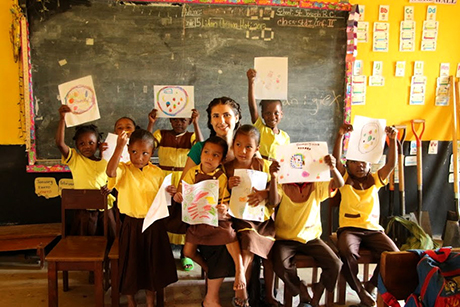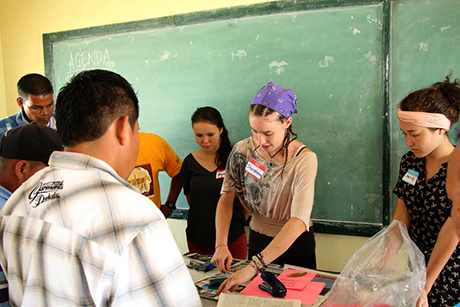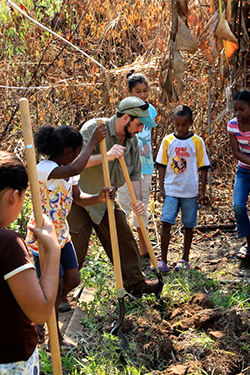Students connect Belize classrooms, gardens, communities
By Craig Cramer


Twelve Cornell students practiced their “taking things in stride” skills when they traveled to Belize over spring break, as part of the Experiential Garden-Based Learning in Belize (HORT/IARD 3200) course.
The students were well-prepared for their mission to lead classroom activities that integrate gardening into the curriculum, reinforce those lessons with hands-on gardening experiences, and engage the community in building and supporting school gardens.
What they didn’t know was that two of the three teachers in the Barranco village school where they were scheduled to work would suddenly be called away for the beginning of the week.
“Our students really rose to the occasion,” said Marcia Eames-Sheavly, senior lecturer in the Department of Horticulture and the course’s instructor. “Particularly in global service learning experiences, we stress the need to be flexible and practical. And the students saw this as an opportunity, not a calamity.”
The Cornell students – organized into three teams around the subjects of language arts, math and science – met the challenge, leading classroom lessons that they developed and piloted with students and youth through the Ithaca Children’s Garden before departing on their adventure. Each team was guided by a mentor, including Tim Davis, 4-H issue leader with Cornell Cooperative Extension of Ontario County; Amy Kohut, director of teambuilding and professional development, Cornell Outdoor Education (COE); Dan Tillemans director, Cornell Team and Leadership Center, COE; and Bryan Sobel, MS candidate in the graduate field of horticulture.

“I watched a whole classroom glisten with interest as we taught our lessons,” said Justin Kondrat ’14. “The experience really showed me the power of garden-based learning.”
Building on classroom activities, Cornell and village students constructed two gardens and a composting area outside the school. Staff from Plenty Belize – a nonprofit organization Eames-Sheavly partners with – and several village residents pitched in. Plenty Belize has helped create school gardens throughout the country’s south.
Before returning to Ithaca, the Cornell students led from start to finish a teacher training session in Belize’s Toledo district, so that other schools in the region could reap the benefits of garden-based learning. Demonstrating their flexibility yet again, the students were unflustered by the surprise of having Punta Gorda Television film all three hours.
“It felt good that we were able to help another community foster their garden-based initiatives and inspire teachers to get excited and motivated to revamp their lesson plans,” said Lourdes Rios ’14.
This was the third year since 2009 that Eames-Sheavly has led garden-based learning expeditions to Belize. The course’s shared goals with partner Plenty Belize extend beyond classrooms and gardens to issues of diversity, improved nutrition, food security and community empowerment.
This year, Eames-Sheavly will realize a dream of engaging Plenty Belize staff and teachers in the American Horticultural Society’s Children and Youth Gardening Symposium, deepening the reciprocity in this project. “From the beginning, we wanted to ensure that this would not be a one-way street,” she said.
“It’s really been win-win,” she continued. “Our students put everything they’ve got into the effort, but they get so much in return.”
“I have never grown, learned and experienced so much in one week,” Fiona Doherty ’13 agreed. “The trip was rich in education, culture, service and self-development. This is by far the most valuable class I’ve taken at Cornell.”
The course is supported in part by the Center for Engaged Learning and Research, the Public Service Center, the Department of Horticulture, and the International Agriculture and Rural Development program.
Craig Cramer is a communications specialist in the Department of Horticulture.
Media Contact
Get Cornell news delivered right to your inbox.
Subscribe